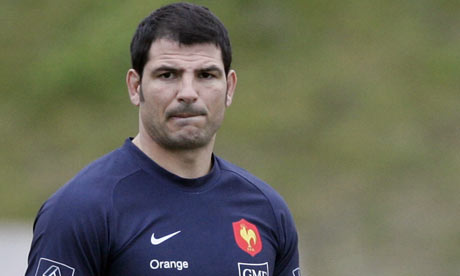
Paris won't feel the same without Jonny Wilkinson, but then again it wouldn't have been familiar even if he had been starting in the No10 shirt because the French have been doing some changing of their own.
Stereotypes are hellish difficult to kick into touch and the one about Paris, the spring and running French rugby has proved more resilient than most. It got a new lease of life last weekend when France ran in six tries against the Italians, but the truth is that those living in that particular golden glow are probably an era or two, and close on a decade, out of date.
The big damage was done by Bernard Laporte, who so wanted France to behave like Anglo-Saxons that he frequently had the Stade de France up in arms with his safety-first, boot-to-ball tactics and a penchant for predictable outside-halves – that is, when he could find them.
That era died with the disappointments of the 2007 World Cup, followed by Laporte's departure for a (brief) spell in the world of politics and the arrival of Marc Lièvremont, a coach who had the rugby world wondering for two seasons before the emergence of a style that could be seen as a third way.
There were hints of what Lièvremont wanted back in the summer and then again in the autumn with wins over the All Blacks in New Zealand and South Africa in Toulouse, but for each step forward, his team took at least one backwards, until the present flowering in this Six Nations.
Whether France are the real deal won't be known until next year's World Cup, but the France that Lièvremont is developing is an interesting hybrid of old and new: it has flair enough to blow good sides away, but has at its core a steely discipline not often associated with French teams at any level. Of course, a decent dust-up in Paris tomorrow might suggest flawed thinking, but the evidence of the past two months is otherwise. No side in this Six Nations has been more disciplined.
Wales suffered badly when we picked up yellow cards in the England and Ireland games, a fine Scotland performance was unhinged by a couple of late bookings in Cardiff, and the first cracks in Ireland's defence were opened up by a sin-binning in Paris. All four acts of ill-discipline changed, to a greater or lesser degree, the course of those games and while Danny Care's rush of blood against Ireland did not earn him 10 minutes in the cooler, it certainly cost England dear.
Against that, it's hard to recall a French player getting close to a card and their discipline against us at Cardiff was such that in the first half we didn't get one kickable penalty. They did to us what we did to them and all the other nations in 2008 when we ended up on the right side of close games because we earned – and kicked – our penalties. However, the parallels with 2008 don't end there and again the issues are discipline-related.
It obviously helps to keep the opposition guessing and throughout this tournament it's been hard to say how France will contest the tackle area. Against Wales they hardly threw anyone into the breakdown.
In theory it left them vulnerable to the pick and go, but in practice they were just too good to let that happen. As a result they had defence in strength right across the field and that brings other rewards, like being able to gamble on making interceptions.
At Cardiff it was François Trinh-Duc who picked off the pass and if you look at the tapes you see how frequently he gets into those positions – something made possible because France have the numbers to plug the hole in the defence created by the fly-half going hunting.
Against England, with a back row of Nick Easter, Lewis Moody and Joe Worsley, France will probably throw more in, as they did against Ireland. Either way it will probably be the call of Dave Ellis, the Yorkshireman who has been the architect of the French defence for close on a decade and one of the few to survive the fall of Laporte.
He can point to a few scalps down the years (remember Serge Betsen's hunting of Wilkinson in 2002) and it will be interesting to see what France have in store – other than the usual blitz defence from his giant centres Yannick Jauzion and Mathieu Bastareaud – for Toby Flood.

